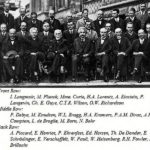Summer School: Experts and Expertise in Motion
Call for Application
Experts and Expertise in Motion
7th GRAINES Summer School, Charles University, 12-15 June 2019
Ever since its establishment Transnational History, however loosely defined, has focused on connections, on flows of people, goods, ideas as well as processes, interconnections and exchange of information in its various forms, that stretch over political and territorial borders. This process-oriented perspective challenges the notion of both the nation and the state as a principal historical category. It questions the binary concept between “centers” and “peripheries” with its single-direction relation. Furthermore, European history has become deeply involved in Global History, and expert networks or scientific transfers are there an important topic too.

Following this perspective, the GRAINES summer school 2019 will engage with the multiple and multi-directional entanglements within and beyond the European continent around “experts” and “expertise in motion”. Experts and expertise shape our modern world and societies, from technology to health care, to decision and policy-making around taxation, education, infrastructure or humanitarian action – to name just a few areas. Experts may work directly in or are associated with the state, yet they also operate beyond and below the state level. They may equally shift between the two, as intermediaries between civil society, science and research on the one hand, and the state on the other. Experts often work in specific institutional settings that produce and provide expertise (e.g. labs, universities, think tanks, academies, learned societies, international organisations). Yet beyond such settings experts form and forge various forms of exchange and cooperation that sets expertise and expert knowledge in motion.
The summer school invites contributions on themes including: the movement of persons, the translocation of objects as well as ideas, the problem of “authority” and “trust” in the establishment of knowledge networks, the forms and reshaping of transnational spheres of “expert” communication and collaboration. We invite contributions on modern European history with Europe understood as an open concept that includes connections within as well as beyond Europe.
The summer school is organised by the Faculty of Arts, Charles University, in cooperation with the Graduate Interdisciplinary Network for European Studies (GRAINES). The program includes reading and discussion groups, lectures and excursions, as well as room for the presentation and discussion of student projects. While the summer school will have a distinct interdisciplinary and trans-epochal character, potential participants should demonstrate historical awareness and general interest in history. We invite postgraduate students from a broad range of theoretical perspectives and disciplines to submit their project proposals to the organisers.
The working language of the summer school is English. It is open to PhD candidates as well as MA students. Accommodation costs will be covered, a limited number of travel bursaries may be available.
To apply, please send your project proposal of maximum 500 words and a one-page CV by 20 February 2019 to [email protected]
Summer school organized by:
Faculty of Arts, Charles University in cooperation with the partners of the Graduate Interdisciplinary Network for European Studies (GRAINES)
For further information on the summer school and GRAINES see
http://grainesnetwork.com/ or https://graines2019.ff.cuni.cz/
